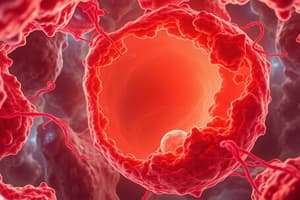Podcast
Questions and Answers
What structure do somitomeres in the cephalic region contribute to during the second week of development?
What structure do somitomeres in the cephalic region contribute to during the second week of development?
- Axial skeleton
- Excretory units
- Dermis formation
- Head mesenchyme (correct)
At what stage do the first pair of somites appear in embryonic development?
At what stage do the first pair of somites appear in embryonic development?
- Approximately at the twentieth day (correct)
- Start of the third week
- End of week five
- End of the second week
What component do myotomes provide for embryonic segments?
What component do myotomes provide for embryonic segments?
- Neural tissue
- Dermal tissue
- Skeletal tissue
- Musculature (correct)
What type of tissue do the cells from the ventral and medial walls of somites become after differentiation?
What type of tissue do the cells from the ventral and medial walls of somites become after differentiation?
How many pairs of somites are typically present at the end of week five of development?
How many pairs of somites are typically present at the end of week five of development?
Which part of the somite gives rise to the dermatome?
Which part of the somite gives rise to the dermatome?
Which of the following structures is formed along with the parietal mesoderm?
Which of the following structures is formed along with the parietal mesoderm?
What does the intermediate mesoderm eventually develop into?
What does the intermediate mesoderm eventually develop into?
What does the visceral mesoderm contribute to in early embryonic development?
What does the visceral mesoderm contribute to in early embryonic development?
What is primarily responsible for the gastro-intestinal tract formation?
What is primarily responsible for the gastro-intestinal tract formation?
During which weeks is the growth in length of the fetus particularly striking?
During which weeks is the growth in length of the fetus particularly striking?
What happens to the proportional size of the head during fetal growth?
What happens to the proportional size of the head during fetal growth?
What are the serous membranes formed by the visceral mesoderm that line the cavities?
What are the serous membranes formed by the visceral mesoderm that line the cavities?
Which derivative is NOT formed from ectoderm?
Which derivative is NOT formed from ectoderm?
Which of the following structures is derived from the mesoderm?
Which of the following structures is derived from the mesoderm?
Which of the following is a derivative of the endoderm?
Which of the following is a derivative of the endoderm?
What is a congenital malformation?
What is a congenital malformation?
Which structure is NOT derived from the neuroectoderm?
Which structure is NOT derived from the neuroectoderm?
Which of the following is formed from the surface ectoderm?
Which of the following is formed from the surface ectoderm?
What does the mesoderm contribute to in terms of organ development?
What does the mesoderm contribute to in terms of organ development?
Which of these structures is formed from the intermediate plate of the mesoderm?
Which of these structures is formed from the intermediate plate of the mesoderm?
What is the function of the cytotrophoblast in early development?
What is the function of the cytotrophoblast in early development?
Which layer of cells is adjacent to the blastocyst cavity and forms part of the bilaminar germ disc?
Which layer of cells is adjacent to the blastocyst cavity and forms part of the bilaminar germ disc?
What defines the syncytiotrophoblast in early embryonic development?
What defines the syncytiotrophoblast in early embryonic development?
What significant event occurs during the third week of development?
What significant event occurs during the third week of development?
What is Heuser's membrane also known as?
What is Heuser's membrane also known as?
Which germ layer is composed of high columnar cells?
Which germ layer is composed of high columnar cells?
What does the extraembryonic mesoderm develop into?
What does the extraembryonic mesoderm develop into?
Which of the following describes the newly formed secondary yolk sac?
Which of the following describes the newly formed secondary yolk sac?
What is the condition of the anterior and posterior neuropores by day 27?
What is the condition of the anterior and posterior neuropores by day 27?
What process takes place when neural crest cells migrate from the neuroectoderm?
What process takes place when neural crest cells migrate from the neuroectoderm?
At what approximate day does the closure of the anterior neuropore occur?
At what approximate day does the closure of the anterior neuropore occur?
What are the two ectodermal thickenings visible in the cephalic region during development?
What are the two ectodermal thickenings visible in the cephalic region during development?
What structure is formed from the otic placode during development?
What structure is formed from the otic placode during development?
What characterizes the broader part of the central nervous system after neurulation is complete?
What characterizes the broader part of the central nervous system after neurulation is complete?
What is the significance of paraxial mesoderm during development?
What is the significance of paraxial mesoderm during development?
What happens to the mesoderm layer between day seventeen and day twenty in development?
What happens to the mesoderm layer between day seventeen and day twenty in development?
Flashcards are hidden until you start studying
Study Notes
Germ Layers and Early Development
- Cytotrophoblast is the inner layer of mononucleated cells.
- Syncytiotrophoblast forms the outer layer of multinucleated cells without distinct boundaries.
- Embryoblast (inner cell mass) differentiates into two layers:
- Hypoblast: Small cuboidal cells next to the blastocyst cavity.
- Epiblast: High columnar cells adjacent to the amniotic cavity.
- Together, the hypoblast and epiblast form the bilaminar germ disc.
Extraembryonic Structures
- Amniotic cavity develops from a small cavity within the epiblast, lined with amnioblasts.
- Heuser's membrane (exocoelomic membrane) forms from hypoblast cells, lining the cytotrophoblast and creating the exocoelomic cavity (primitive yolk sac).
- By day eleven, the blastocyst is embedded in the endometrial stroma.
- Extraembryonic mesoderm forms, creating spaces that divide it into splanchnopleuric (facing exocoelomic membrane) and somatopleuric (facing cytotrophoblast) layers.
- On day thirteen, migration of hypoblast cells creates a secondary yolk sac, smaller than the primary, with remnants forming exocoelomic cysts.
Gastrulation and Trilaminar Germ Disc Formation
- Gastrulation in the third week establishes all three germ layers.
- Key structures observed include the neural fold, primitive node, primitive streak, somite, and neural groove during embryonic development.
- The neural tube closes between days 25 and 27, marking the completion of neurulation.
- Neural crest cells dissociate from neuroectoderm and migrate into mesoderm.
Development of Ectoderm
- Otic placode and lens placode develop into auditory and visual structures respectively.
- Paraxial mesoderm thickens and segments into somites, forming head mesenchyme and forming the axial skeleton.
- Somites differentiate into:
- Sclerotome: Surrounds the spinal cord, forming the vertebral column.
- Dermomyotome: Forms myotomes (musculature) and dermatomes (dermis).
Mesoderm and Germ Layer Derivatives
- Mesoderm differentiates into visceral (splanchnic) and parietal (somatic) components, forming body walls and gut linings.
- Intermediate mesoderm becomes excretory units of the urinary system.
- Blood vessels originate from mesoderm cells in the yolk sac, linking the embryo to the placenta.
Endoderm Development
- Endoderm primarily forms the gastrointestinal tract through lateral folding, incorporating portions of the yolk sac.
- Organ systems established by the second month include significant features recognizable in the embryo.
Fetal Growth Period
- The fetal period spans week 9 to birth, characterized by rapid growth and organ maturation.
- Head growth slows significantly compared to body growth as the fetus develops.
Germ Layer Derivatives
-
Ectoderm results in structures such as:
- Neural crest: Spinal and autonomic ganglia, bones of the skull, melanocytes.
- Surface ectoderm: Epidermis, hair, nails, salivary glands.
- Neuroectoderm: Central nervous system, retina, posterior pituitary.
-
Mesoderm differentiates into:
- Urogenital structures and visceral components.
- Connective tissue and muscle systems.
-
Endoderm forms epithelial components for the trachea, digestive tract, liver, and more.
Congenital Malformations
- Defined as gross structural defects present at birth, highlighting the significance of proper embryonic development.
Studying That Suits You
Use AI to generate personalized quizzes and flashcards to suit your learning preferences.


